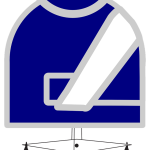Traumatic brain injuries (TBIs) are far more common than we would like them to be. According to the Brain Trauma Foundation, approximately 2.5 million individuals suffer TBIs annually, which can result in severe consequences such as disabilities, paralysis, and tragically, death. A significant contributor to the cause of traumatic brain injuries is the rising popularity of scooters, particularly electric ones, especially among children and young adults.The increase of these accidents has introduced new risks to urban environments, where accidents involving scooters frequently lead to traumatic brain injuries, especially when helmets are not worn, or buckled properly.
A scooter accident lawyer in Florida is well ware of the devastating injuries that often arise from these types of accidents. They witness firsthand the profound impact that traumatic brain injuries can have on individuals’ lives and their families. For this reason, they also emphasize the critical importance of being able to recognize the signs and characteristics of traumatic brain injuries. Understanding these characteristics is key to ensuring prompt medical attention and early intervention. Being able to recognize key TBI characteristics helps in identifying, addressing, and mitigating the risk of long-term complications and potentially life-threatening injuries. This awareness highlights the vital role that early medical intervention plays in safeguarding individuals' well-being following a scooter accident.
Why Wearing A Helmet On A Scooter Is Important
Scooters, especially electric scooters, have become a popular mode of transportation, and many kids use them as a source of fun. They provide a convenient and eco-friendly way to navigate city streets, or be used as a pastime in neighborhoods. However, as ridership increases, so does the importance of knowing and using safety precautions. Brain injuries are among the most common and severe consequences of scooter accidents.
The human skull offers limited protection to the brain, and any impact can result in traumatic brain injuries, which can have long-lasting and life-altering effects, or even cause death. Wearing a helmet can significantly reduce the risk of head trauma, brain injuries, and even fatalities by providing a crucial protective barrier. In the event of a collision or fall, a helmet will absorb a better part of the impact energy, effectively becoming the last line of defense. They are proven to protect against the devastating consequences of a head injury, ensuring that you can continue enjoying life safely.
Common Traumatic Brain Injury Symptoms
Recognizing the wide range of symptoms that could indicate a traumatic brain injury after a scooter accident in Florida is crucial. No matter how seemingly minor these symptoms may appear to be, it's important not to dismiss them and to seek medical care immediately.
Mild TBI Symptoms
Mild traumatic brain injuries (mTBIs) are the least damaging form of TBI and can present themselves through various symptoms, including physical, sensory, and cognitive changes.
-
Physical Symptoms – Common physical traumatic brain injury symptoms include:
-
Headache
-
Nausea or vomiting
-
Fatigue or drowsiness
-
Problems with speech
-
Dizziness or loss of balance
-
-
Sensory Symptoms – Sensory symptoms refer to changes or disruptions in how a person’s senses function, such as vision, hearing, taste, or smell. Sensory symptoms from a mild brain injury can include:
-
Blurred vision
-
Ringing in the ears
-
A bad taste in the mouth
-
Changes in the ability to smell
-
Sensitivity to light or sound
-
-
Cognitive, Behavioral, or Mental Symptoms – Mild brain injury symptoms that relate to cognitive, behavioral, or mental functions include:
-
Loss of consciousness for a few seconds to a few minutes
-
Dazed
-
Confused
-
Disoriented state without loss of consciousness
-
Memory or concentration problems
-
Mood changes or mood swings
-
Feeling depressed or anxious
-
Difficulty sleeping
-
Sleeping more than usual
-
No matter how mild these symptoms may seem, seeking medical care, or scheduling an appointment with a physician, is important. Do not dismiss them as they can turn worsen and cause severe consequences if not addressed.
Moderate TBI Symptoms
In addition to the signs and symptoms of mild traumatic brain injuries, moderate to severe cases can manifest after a scooter accident. According to the Mayo Clinic, the following symptoms can present themselves within the first hours to days after a head injury:
-
Physical Symptoms Of Moderate Brain Injuries:
-
Loss of consciousness lasting from minutes to hours
-
Persistent or worsening headache
-
Recurrent vomiting or nausea
-
Convulsions or seizures
-
Dilation of one or both pupils of the eyes
-
Draining clear fluids from the nose or ears
-
Inability to wake from sleep
-
Weakness or numbness in fingers and toes
-
Loss of coordination
-
-
Cognitive or Mental Symptoms Of Moderate Brain Injuries:
-
Profound confusion
-
Agitation, combativeness, or other unusual behavior
-
Slurred speech
-
Coma and other disorders of consciousness
-
It's essential not to overlook any of these symptoms after a scooter accident, no matter how seemingly insignificant they may be. They may not appear right away, which is why it is important to seek medical attention promptly after a head injury. It is also a good idea to consult with an electric scooter accident lawyer to determine what your rights are.
Severe Brain Injury Symptoms
In cases of severe traumatic brain injuries (TBIs), it's crucial to be aware of a range of symptoms. While they typically manifest quicker than others, however, they may present themselves days after a head injury. While individuals with moderate or severe TBIs may exhibit some of the symptoms associated with mild TBI, they may also experience additional symptoms such as:
-
Headache that worsens or persists
-
Loss of vision in one or both eyes
-
Persistent vomiting or nausea
-
Slurred speech
-
Convulsions or seizures
-
Difficulty waking up from sleep
-
Enlargement of the pupil (dark center) of one or both eyes
-
Numbness or tingling in the arms or legs
-
Uncoordinated or "clumsy" movements
-
Increased confusion, restlessness, or agitation
-
Loss of consciousness lasting from a few minutes to hours
Even if none of these symptoms are immediately present after a head injury, it is still important to seek medical attention. Symptoms may sometimes manifest well after the injury has occurred, but ignoring them will cause other severe consequences, or even cause death.




